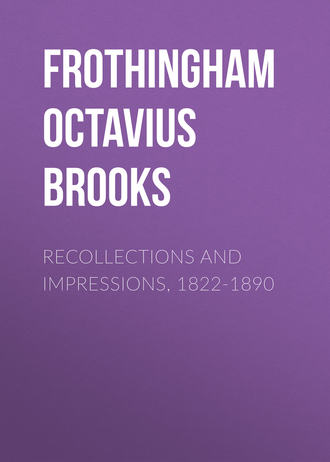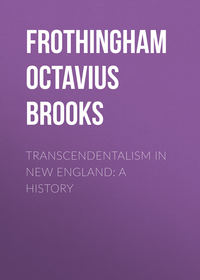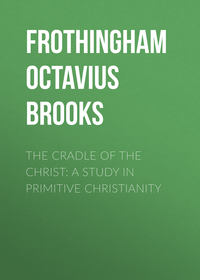 полная версия
полная версияRecollections and Impressions, 1822-1890
The future life is no longer associated with retribution, and immortality means opportunity instead of doom. Should the doctrine of moral influence follow upon the doctrine of spiritual progression, the essential significance of the tenet would be preserved, for that is ethical not individual.
Prayer, too, is no more a begging for favors, or an act of intercession. Supplication for outward benefits has given place to petition for spiritual gifts, and this to pure aspiration, the desire for excellence; still the soul's passion is as deep as ever, perhaps deeper.
If Mr. Tyndall's prophecy should be fulfilled, and we should come to "discover in that matter which we, in our ignorance, and notwithstanding our professed reverence for its Creator, have hitherto covered with opprobrium, the promise and potency of every form and quality of life," then what we call matter would simply assume new properties commensurate with novel tasks. The properties themselves will remain as they were, and will in nowise change their peculiarity. The ancient attributes of mind will persist, whatever theory of their origin be adopted. The old sanctities will endure, and the burden of responsibility will fall upon another pair of shoulders.
Thus every virtue will be maintained in complete vigor, – reverence, aspiration, trust, submission, confidence, serenity, patience, fortitude, – and nothing will be lost.
Then there is the social world, in which we "live and move and have our being." This "encompasses us behind and before, and lays its hand upon us." There is not an hour in the day, hardly a moment of the hour, when the call of duty is not made upon us. None but the rarest spirits discharge the claims of mercy and brotherhood; people generally do not know what they are; repudiate them when presented. The preachers have more than they can do to induce practice of even the commonest virtues of good will. Humanity, in its grand aspects, is left to the writers of Utopias. Not a day passes that conscience is not over-worked, even when it is not perplexed by misgivings in regard to the amount or the kind of service it ought to render. Some have sought an escape in the immortal life from the demands of this; and some have denied the doctrine of another world because it drew attention away from this, and made the ills of the present seem light in view of some coming beatitude. In truth, the friends of that great hope will do well to remember that it is identical with moral attainment; that it is for great souls; that
The life of heaven above,Springs from the life below.It is, to say the least, doubtful whether any future life can do more than ripen seeds that are sowed here, or whether spiritual perfection will owe anything essential to other events of time, while it is certain that nothing is sure to abide but what is born of love.
Unless the doctrine of a future life can be used to reinforce the doctrine of moral attainment in the present state of existence, its power must depart. The cords of personal affection are not strong enough to hold the belief. The true inference from disbelief is not expressed in the words, "Let us eat and drink for tomorrow we die"; but in these, "I must work while it is day." This idea is a very old one. The air was full of it when I was a youth. It was the soul of all liberal faith. The Westminster Review, which was in full force in my early manhood, having begun in 1824, two years after my birth, was animated by it. The Prospective Review, the organ of the spiritual Unitarians, and edited by such men as James Martineau, John James Taylor, John Hamilton Thom, and Charles Wicksteed, a magazine aiming to "interpret and represent Spiritual Christianity in its character of the Universal Religion," was started about 1845. In its pages "spirituality" was intimately associated with "humanity." The books of F. W. Newman, "The Soul" (1849); "Phases of Faith" (1850); "Catholic Union" (1854), teemed with this conception. The charming verses of William Blake, published in his "Songs of Innocence," had somehow came to my knowledge.
To mercy, pity, peace, and love,All pray in their distress;And to these virtues of delightReturn their thankfulness.For mercy, pity, peace, and loveIs God, our Father dear;And mercy, pity, peace, and loveIs man, His child and care.For mercy has a human heart;Pity, a human face;And love, the human form divineAnd peace, the human dress.Then every man of every climeThat prays, in his distress,Prays to the human form divineLove, Mercy, Pity, Peace.And all must love the human formIn Heathen, Turk, or Jew;Where mercy, love, and pity dwell,There God is dwelling too.In this country the same idea prevailed in the early period of transcendentalism, and gradually worked its way into the common heart. Channing lent it an impulse. His brilliant nephew, William Henry Channing, exemplified it. The transcendental preachers all insisted on it. The "Dial" was charged with it. The most kindling literature of my growing days drew inspiration from it. Brook Farm, Fruitlands, and every other attempt at association was built upon it. Modern socialism owes to it the fascination it has for the heart; and we cannot listen to a sermon now that does not throb with the emotion it excites.
For myself I must confess that I have no interest in another life, save as it encourages the endeavor after this human excellence. My mental constitution makes me insensible to sentimental considerations, to arguments addressed to private affections. As my first sermon was about the brotherhood of man, so my present hope is that love may increase, and that the reign of theology may be succeeded by that of charity.
This was the dream of Abbot Joachim, in the twelfth century, the Cistercian monk, founder of the monastery of Floris, author of "The Everlasting Gospel." It was his notion that the existing era of Christianity was passing away. According to him, there were three dispensations, corresponding to the three persons in the Trinity – that of the Father, that of the Son, that of the Spirit, – the dispensation of Awe, the dispensation of Wisdom, and the dispensation of Love. The first was represented by Peter, the organizer, the patron saint of Romanism; the second, by Paul, the preacher of the Word, the bulwark of Protestantism; the third by John, the seer, the beloved disciple, the apostle of love. How much the pious man meant by this we cannot tell. His own contemporaries were divided in opinion; but a pretty fair commentary is furnished, in the fact that his writing was condemned by two Councils – that of the Lateran in 1215, and of Arles in 1260, – and that he has ever since been classed among the mystics – that is, the unintelligible and the unbalanced in mind.
True the prophecy has not been literally fulfilled, inasmuch as the first two dispositions are still in force, and are likely to be for many a day, but the essence of it has come to pass. Romanism has been deprived of its temporal authority, and is reduced to a picturesque form of faith; its disciples easily throw off its bondage, while its new professors never put it on. Protestantism is decomposing under the influence of doubt and criticism. The thought of brotherhood is extending. I have small faith that the time will ever come when all people will worship under one form, or will accept the same mode of believing. I cannot think that at the name of Jesus every knee will bow, or that every tongue will make confession of his Lordship; but I do believe that the reign of justice and good-will shall be established. It is a great deal to hope for a time when the many will submit to the law of reason, becoming strong enough to withstand the force of authority in church or creed, and content with charity.
We have gained much since Joachim's day. We have acquired knowledge, industry, civilization, freedom, enterprise, intelligence, the sense of mutual dependence. The bars of prejudice are being taken down. Class distinctions are being abolished. Newly discovered arts are bringing men nearer together, and weaving the ties of fraternity. All this is opportunity – opportunity that immediately precedes performance. When we see the road prepared for the Spirit, we may be sure that the Spirit itself is not far off.
1
"Vorträge und Abhandlungen," von E. Zeller, 2 vols., Leipzig.
2
Reprinted from the Unitarian Review of May, 1888.
3
We copy from a private letter the following account of the origin of this club and of its grotesque name, which has lost, alas! its significance to the younger generation. "In the year 1844 (I think it was) a few of us young ministers formed a club, including Charles Brigham, Edward Hale, John Weiss, with one or two elders, as Dr. Hedge and, later, O. B. Frothingham, Starr King, W. R. Alger, William B. Greene, and others. We went long without a name, in spite of my urgent appeals as Secretary, till one fine day, at George R. Russell's house in West Roxbury, in an after-dinner frolic, Weiss turned the garden-engine hose upon a fellow-member and drenched him from head to foot; upon which escapade it was unanimously agreed to call ourselves the 'Hook-and-Ladder,' by which name the memory of it is fondly kept among us to this day. A similar older fraternity had gone by the name of the 'Railroad Association,' and, in imitation, when it was proposed to borrow a title from some like line of industry we, on this sudden whim, chose the fire-department."
4
It occurs in "American Religion," p. 149.



